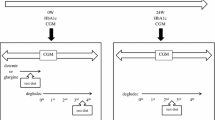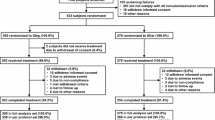Abstract
We retrospectively investigated the effect of switching from insulin glargine (IGlar) to insulin degludec (IDeg) on glycemic control in Japanese patients with type 1 diabetes mellitus. We also evaluated the dose of IDeg, and assessed weight gain and the risk of hypoglycemia after switching. Forty-five patients with type 1 diabetes were switched from IGlar (once daily or twice daily) to IDeg (once daily) during routine medical care. Data were collected for 16 weeks after switching from IGlar to IDeg. The mean HbA1c (%) in weeks 4, 8, 12, and 16 was lower than it was in week 0 (8.0 ± 1.0, 8.0 ± 1.4, 7.9 ± 1.1, 7.6 ± 1.0 vs. 8.3 ± 1.3 %, p < 0.01). The total basal insulin dose (TBD) was significantly lower after 16 weeks of IDeg as compared to IGlar treatment (0.30 ± 0.12 vs. 0.24 ± 0.11 U/kg/day, p = 0.001). In the twice-daily IGlar group, TBD showed a significant decrease from 0.33 ± 0.12 to 0.26 ± 0.11 U/kg/day (p < 0.001) after switching to IDeg. In the once-daily IGlar group, TBD showed a slight but not significant decrease from 0.23 ± 0.08 to 0.20 ± 0.09 U/kg/day (p = 0.97). Hypoglycemic episodes were transiently increased, but the change was not significant. The blood glucose fluctuation was evaluated from self-monitoring data and the coefficient of variation (CV) was calculated. The CV showed only a minimal change from 48.3 ± 17.1 to 48.6 ± 14.2 % at 12 weeks after switching to IDeg (p = 0.73). In conclusion, once-daily IDeg improved glycemic control in patients with type 1 diabetes compared to the control achieved with IGlar, without increasing the risk of hypoglycemia. When switching from IGlar (especially twice daily), it is recommended that the initial dose of IDeg should be reduced in order to decrease the risk of hypoglycemia.

Similar content being viewed by others
References
Nathan DM, Cleary PA, Backlund JY, Genuth SM, Lachin JM, Orchard TJ, Raskin P, Zinman B. Intensive diabetes treatment and cardiovascular disease in patients with type 1 diabetes. N Engl J Med. 2005;353(25):2643–53.
The Diabetes Control and Complications Trial Research Group. The effect of intensive treatment of diabetes on the development and progression of long-term complications in insulin-dependent diabetes mellitus. N Engl J Med. 1993;329(14):977–86.
Tibaldi JM. Evolution of insulin development: focus on key parameters. Adv Ther. 2012;29(7):590–619.
Heller S, Buse J, Fisher M, Garg S, Marre M, Merker L, Renard E, Russell-Jones D, Philotheou A, Francisco AM, et al. Insulin degludec, an ultra-longacting basal insulin, versus insulin glargine in basal-bolus treatment with mealtime insulin aspart in type 1 diabetes (BEGIN Basal-Bolus Type 1): a phase 3, randomised, open-label, treat-to-target non-inferiority trial. Lancet. 2012;379(9825):1489–97.
Heise T, Hermanski L, Nosek L, Feldman A, Rasmussen S, Haahr H. Insulin degludec: four times lower pharmacodynamic variability than insulin glargine under steady-state conditions in type 1 diabetes. Diabetes Obes Metab. 2012;14(9):859–64.
Ratner RE, Gough SC, Mathieu C, Del Prato S, Bode B, Mersebach H, Endahl L, Zinman B. Hypoglycaemia risk with insulin degludec compared with insulin glargine in type 2 and type 1 diabetes: a pre-planned meta-analysis of phase 3 trials. Diabetes Obes Metab. 2013;15(2):175–84.
Japan Diabetes Society (ed.). Evidence-based practice guideline for the treatment for diabetes in Japan 2013. Tokyo: Nankodo; 2013.
Bolli GB, Perriello G, Fanelli CG, De Feo P. Nocturnal blood glucose control in type I diabetes mellitus. Diabetes Care. 1993;16(Suppl 3):71–89.
Ashwell SG, Gebbie J, Home PD. Twice-daily compared with once-daily insulin glargine in people with type 1 diabetes using meal-time insulin aspart. Diabet Med. 2006;23(8):879–86.
Ishii H, Furuya M, Iburi T, Yamagami K, Ishibashi R, Tsujii S. Quality of life in insulin-treated patients. J Jpn Diabet Soc. 2008;51:601–8.
Bode BW, Buse JB, Fisher M, Garg SK, Marre M, Merker L, Renard E, Russell-Jones DL, Hansen CT, Rana A, et al. Insulin degludec improves glycaemic control with lower nocturnal hypoglycaemia risk than insulin glargine in basal-bolus treatment with mealtime insulin aspart in type 1 diabetes (BEGIN((R)) Basal-Bolus Type 1): 2-year results of a randomized clinical trial. Diabet Med. 2013;30(11):1293–7.
Landstedt-Hallin L. Changes in HbA1c, insulin dose and incidence of hypoglycemia in patients with type 1 diabetes after switching to insulin degludec in an outpatient setting: an observational study. Curr Med Res Opin. 2015;31(8):1487–93.
Kobuke K, Yoneda M, Nakanishi S, Ohno H, Maeda S, Egusa G. Efficacy and safety of insulin degludec in Japanese patients with type 1 and type 2 diabetes: 24-week results from the observational study in routine clinical practice. J Diabetes Invest. 2016;7(1):94–99.
Tosaka Y, Kanazawa A, Ikeda F, Iida M, Sato J, Matsumoto K, Uchida T, Tamura Y, Ogihara T, Mita T, et al. Switching from twice-daily basal insulin injections to once-daily insulin degludec injection for basal-bolus insulin regimen in Japanese patients with type 1 diabetes: a pilot study. Int J Endocrinol. 2015;176261172015:176261.
Komuro M, Inoue G, Tabata M, Yamada Y, Atsuda K, Matsubara H, Irie J, Uchida J, Nakajima C, Izumi H, et al. Insulin degludec requires lower bolus insulin doses than does insulin glargine in Japanese diabetic patients with insulin-dependent state. J Diabetes Sci Technol. 2015;9(3):632–8.
Ceriello A, Esposito K, Piconi L, Ihnat MA, Thorpe JE, Testa R, Boemi M, Giugliano D. Oscillating glucose is more deleterious to endothelial function and oxidative stress than mean glucose in normal and type 2 diabetic patients. Diabetes. 2008;57(5):1349–54.
Monnier L, Mas E, Ginet C, Michel F, Villon L, Cristol JP, Colette C. Activation of oxidative stress by acute glucose fluctuations compared with sustained chronic hyperglycemia in patients with type 2 diabetes. JAMA. 2006;295(14):1681–7.
Temelkova-Kurktschiev TS, Koehler C, Henkel E, Leonhardt W, Fuecker K, Hanefeld M. Postchallenge plasma glucose and glycemic spikes are more strongly associated with atherosclerosis than fasting glucose or HbA1c level. Diabetes Care. 2000;23(12):1830–4.
Acknowledgments
This work was conducted independently; no company or institution supported it financially. We thank Mrs. Yamagiwa and Mrs. Seki for secretarial assistance.
Author information
Authors and Affiliations
Corresponding author
Ethics declarations
Conflict of interest
We thank all the physicians who participated in this study. Yasuo Terauchi received honoraria for lectures from MSD K.K.; Ono Pharmaceutical Co., Ltd.; Nippon Boehringer Ingelheim Co., Ltd.; Novartis Pharma K.K.; Takeda Pharmaceutical Co., Ltd.; Mitsubishi Tanabe Pharma Corp.; Daiichi Sankyo Co., Ltd.; Sanwa Kagaku Kenkyusho Co., Ltd.; Kowa Pharmaceutical Co., Ltd.; Novo Nordisk Pharma Ltd.; Eli Lilly Japan K.K.; Sanofi K.K.; Shionogi & Co., Ltd.; Bayer Yakuhin, Ltd.; and AstraZeneca K.K., and obtained research support from MSD K.K.; Ono Pharmaceutical Co., Ltd.; Nippon Boehringer Ingelheim Co., Ltd.; Novartis Pharma K.K.; Takeda Pharmaceutical Co., Ltd.; Mitsubishi Tanabe Pharma Corp.; Daiichi Sankyo Co., Ltd.; Sanwa Kagaku Kenkyusho Co., Ltd.; Novo Nordisk Pharma Ltd.; Eli Lilly Japan K.K.; Sanofi K.K.; Dainippon Sumitomo Pharma Co., Ltd.; Shionogi & Co., Ltd.; Bayer Yakuhin, Ltd.; Astellas Pharma, Inc.; Pfizer Japan, Inc.; and AstraZeneca K.K. Tadashi Yamakawa received honoraria for lectures from MSD K.K.; Kowa Pharmaceutical Co., Ltd.; Novo Nordisk Pharma Ltd.; and Sanofi K.K., and obtained research support from AstraZeneca K.K. Jun Suzuki, Joe Nagakura, Erina Shigematsu, and Kazuaki Kadonosono declare that they have no conflict of interest.
Human rights statement and informed consent
All procedures followed were in accordance with the ethical standards of the responsible committee on human experimentation (Yokohama City University School of Medicine, an Ethical Committee) and with the Helsinki Declaration of 1964 and its subsequent revision.
About this article
Cite this article
Suzuki, J., Yamakawa, T., Nagakura, J. et al. Efficacy of switching from insulin glargine to insulin degludec in patients with type 1 diabetes: a 16-week retrospective study. Diabetol Int 8, 45–51 (2017). https://doi.org/10.1007/s13340-016-0275-x
Received:
Accepted:
Published:
Issue Date:
DOI: https://doi.org/10.1007/s13340-016-0275-x




